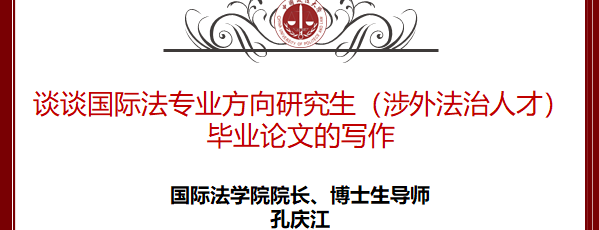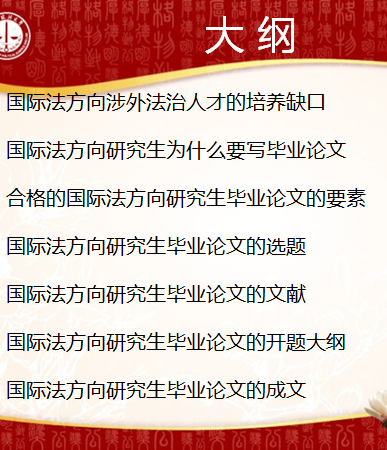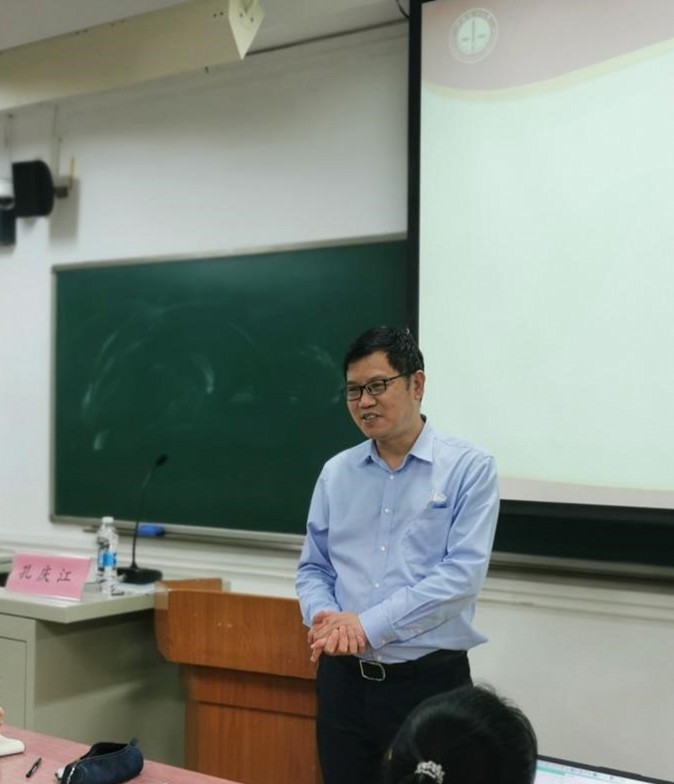On 9 June 2021, the China-EU School of Law (CESL) Lecture Series on “Supervising and Writing of Master's Thesis” was successfully held in Room 305 of the Mingfa Building, on the Changping Campus of CUPL. Professor Kong Qingjiang, Dean of School of International Law, CUPL, was invited to CESL to share insights about the thesis writing experience and give valuable suggestions for CESLers, particularly those majoring in international law. The lecture was hosted by Dr. Zhao Tianshu from CESL.

At the beginning, Professor Kong talked about the lack of foreign-related legal talent training in our country. Due to the shortage of training courses, the lack of practical training and cross-cultural communication environment, there were some problems about the “capacity” of foreign-related legal talents such as defects in knowledge structure, inability to deal with practical matters, insufficient familiarity with foreign culture and analytical methodology. It was also the reason why Chinese talents were comparatively rare in important positions in international organizations. In this regard, Professor Kong expressed deep regret. He hoped that every student would no longer treat thesis writing just as a task, but an important way to obtain writing ability, retrieval ability, thinking ability, and ability to withstand pressure. Thesis writing can improve student’s writing and analytical skills.
Then, Professor Kong introduced the key points of the degree thesis of international law from five aspects: the qualified elements of the thesis, the topic selection, the reference, the outline of the topic, and the writing.

Professor Kong believed that a qualified degree thesis should have innovative topics, demonstrated views, contents rich in supporting materials, and progressive or parallel logical order.
“The good topic is essential to the whole text’s quality.” Professor Kong emphasized that it was difficult to raise a valuable academic question without sufficient reading, thinking and a thorough review of previous studies. The topic of the thesis must be innovative, accurate, appropriate, scientific, important, and forward-looking. It must be a real problem, not a fake one; it should not be too deep to understand but the author should have the ability to finish it; the topic is rather small but not big; it can neither rest on its laurels nor deliberately seek superficial innovation.
When talking about reading academic literature, Professor Kong proposed the "limit principle." Reading literature helped to understand the academic tradition, determine the topic, discover research angles, and accumulate arguments. The wider the scope of reading literature, the more clues could be obtained. But it did not mean that all the documents should be read, but to make further choices and intensive reading based on the extension of thinking. In the process of searching for documents, students could expand the sources of literature by searching for the keywords of the topic, the synonyms of the keywords, and the references in the documents.
In the writing process, a well-designed outline could not only enrich the author’s ideas, check for deficiencies, and manage the research of the thesis, but also determine the thesis’s structure and viewpoints, and provide guidance for further searching. As for the writing method of the thesis, Professor Kong summarized it into three main points: The introduction of the thesis should be vigorous and dazzling; the main text should combine the perspective of the researcher and the readers, and move smoothly, rigorously and richly; the conclusion should be deep, powerful and thought-provoking.

During the Q&A, Professor Kong answered the questions raised by the students with enthusiasm and encouragement. At the end of the lecture, Professor Kong made four suggestions: start the thesis writing as soon as possible, improve the reading reserve of academic literature, try to develop research habits, write more, and practice more.
The lecture ended successfully with the applause of students.
Photo | SONG Yan, CESL double master student from 2020 intake
Writing | WENG Yan, CESL double master student from 2020 intake
Translation | ZHAO Xin, CESL double master student from 2020 intake
